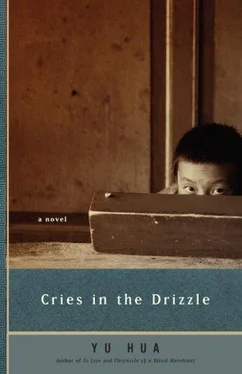That evening, as the village lay bathed in moonlight, the peddler left Southgate. His departure coincided with the disappearance of Feng Yuqing.
PASSINGS
One lunchtime that summer my little brother, Sun Guangming, who had learned how to swagger from my older brother, walked toward the river to catch snails. In my mind's eye I glimpse the scene once more. Dressed in shorts, he picks up his basket from the corner of the room and steps outside. The sunlight beats down on his bare back, so tanned that it seems to be glistening with oil.
A blurry picture appears before my eyes, as though I can see time in motion. Time becomes visible, a translucent gray whir, and everything has its place within that dark expanse. Our lives, after all, are not rooted in the soil as much as they are rooted in time. Fields, streets, rivers, houses — these are our companions, placed like ourselves in time. Time pushes us forward or back, and alters our aspect.
When my little brother left the house that fateful summer day, his leave-taking was entirely routine — he must have left the house a thousand times before in just the same way. But because of the outcome of this particular departure, my memory has altered the particulars of that moment. When I traverse the long passage of memory and see Sun Guangming once more, what he was leaving then was not the house: what he exited so carelessly was time itself. As soon as he lost his connection with time, he became fixed, permanent, whereas we continue to be carried forward by its momentum. What Sun Guangming sees is time bearing away the people and the scenery around him. And what I see is another kind of truth: after the living bury the dead, the latter forever lie stationary, while the former continue their restless motion. In the stillness of the dead, we who still roam can see a message sent by time.
A village boy, eight years old that year, waited outside the door for my little brother, basket in hand. I had noticed subtle changes in Sun Guangming. No longer did he tag along behind my big brother, for he preferred now to rub shoulders with other boys of seven or eight who were beneath Sun Guangpings notice, thereby enjoying the same kind of prestige among the village children that my older brother was himself accustomed to command. As I sat by the pond, I often saw kids who were still unsteady on their legs clustered around Sun Guangming as he bustled about self-importantly
That day I watched from the rear window as my little brother walked toward the river in my father's huge straw sandals, throwing up clouds of dust as he proceeded along the path, his angular behind and tiny head propelled forward by his oversize footwear. As he reached the house so recently vacated by the Su family, he balanced the basket on the top of his head with the result that his body, normally so unruly, suddenly acquired a stiff and erect posture. Sun Guangming hoped to maintain this balancing act all the way to the river, but the basket would not cooperate, tumbling into the rice field adjoining the path. He simply glanced back briefly before continuing his advance. His eight-year-old companion clambered down into the paddy and retrieved the basket. Sun Guangming walked complacently toward his demise, while the boy behind, who would have many more years to live, carried a basket in each arm and trailed wearily in the footsteps of his ill-fated mentor.
Death did not elect a direct approach but established contact through this intermediary. While Guangming stuck close to the riverbank as he foraged for snails, the other boy, unable to resist temptation, made a rash plunge into a spot where the water was deeper. In a second he lost his footing and tumbled headfirst into the river. As he struggled he gave a desperate cry, a cry that was to be my brother's ruin.
Sun Guangming drowned trying to save him. It would be going too far, of course, to present this as an act of heroic self-sacrifice. My little brother had not reached a level of such lofty.virtue as to be willing to exchange his own life for someone else's. It was his authority over the other boy that prompted his action. When death threatened his sidekick, he jumped to the conclusion that saving him would be easy.
The rescued boy was unable to recall what actually happened, and all he could do was stare dumbfounded at his questioners. Several years later, when people raised the topic with him, he seemed unconvinced that the accident had ever occurred, as though the story was all cock-and-bull. If one of the villagers hadn't witnessed the incident, people might well have thought that Sun Guangming drowned all by himself.
When it happened, the villager was crossing the wooden bridge. He saw how Sun Guangming gave the boy a shove and how the boy splashed his way frantically to the bank, leaving Sun Guangming to struggle in the water. When my brother stuck his head out for the last time, he gazed at the blinding sun with his eyes wide open, maintaining that posture for several seconds before he sank beneath the surface. Several days later, after my brother's burial, I sat by the pond at midday and attempted to look straight at the sun, but the glare forced me to avert my eyes. So I discovered a difference between life and death: a clear view of the sun is inaccessible to the living — only people who are about to die can see the sun as it is.
When the horrified onlooker came running over, I did not yet realize what had happened. His cries exploded in the air like shards of glass. Sun Guangping had been peeling a sweet potato with his sickle and was just about to eat it. He flung the tool aside and charged out the door. As he ran he called my father, who dashed from the vegetable plot, and the two of them raced toward the riverside. My mother also appeared on the road, and the scarf that she was clutching in her hand fluttered as she ran. I heard my mother's piercing wails and somehow they gave me the impression that even if my brother was still alive, he would die all over again.
I had always worried about some kind of disaster affecting our family. My eccentricity in operating outside the family circle was already taken for granted by the villagers, and as far as I was concerned it was better this way, better to be forgotten. If something went wrong at home, on the other hand, this would make me stand out and again be the object of peoples attention. So as I watched the villagers run toward the river, I felt a huge pressure bearing down on me. It would have been perfectly natural for me to have run to the riverside too, but my fear was that this would give both my family and the villagers the impression that I was actually rejoicing over misfortune. My best option at this point was to keep well out of the way, and only late that evening did I finally return home. At nightfall, when I went down to the riverside, the river gently murmured as it tossed a little flotsam about on the current, and the water's babble was just as soothing as it had always been. The river that had just swallowed up my little brother seemed as placid as ever. I saw village lights in the distance, and the breeze brought a hubbub of voices to my ears: my mother's intermittent wails, accompanied by sympathetic sobs from other women. There in the background was a scene of grief and lamentation, while in the foreground the river, fresh from its lethal exploit, behaved as if nothing had happened. It was at that point that I realized that the river was itself alive: it swallowed up my brother because it needed another life to supplement its own. The wailing women and grieving men off in the distance likewise needed other lives to enhance theirs. They were harvesting vegetables that had been happily growing just a moment ago, or they would slaughter a pig, taking lives just as offhandedly as the river flowing past me.
Sun Kwangtsai and Sun Guangping dove into the river, and between them they brought Sun Guangming up to the surface. They found his body under the wooden bridge, and when he was dragged onto the bank his face was the color of grass. Sun Kwangtsai, though already exhausted, grabbed Sun Guangming by the feet, slung him headfirst over his shoulder, and took off down the path on the run. Sun Guangming's body swayed violently on Father's back, his head knocking rhythmically against my father's shanks. My big brother ran along behind. On that summer day three bodies seemed to merge into one as they raced down the path, enveloped in clouds of dust. Behind them came my mother, still sobbing, still clutching her scarf, and a swarm of villagers.
Читать дальше












